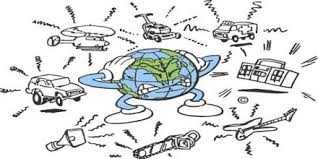
Rafat Hossain:
We often hear the word ‘Pollution’ every day, everywhere at home and beyond; in the newspapers, books, and media in general.
So what is it and why is it so important need to be explained.
Pollution surfaces when pollutants contaminate our natural environment; changing our normal lifestyle for the worse. It disturbs our ecosystem and tampers with the balance in nature. With modernization and development in our lives, nowadays pollution has reached its peak.
One of the kinds of pollution is sound pollution. It is often thought to be less serious comparing with others. But it has become an invisible threat today.
Noise pollution is a serious problem in Dhaka now. According to a recent WHO study on 45 locations in the city, Dhaka’s busy streets often have decibel levels much higher than recommended.
There are many causes of sound pollution. Some of the key causes are to do with noises created in roads and busy marketplaces. The drivers of vehicles often use their hydraulic horns to create unnecessary blaring noise. Noise from other methods of travel are also common, such as those from railway, aircraft, or rickshaws. Loudspeakers are also regularly used for many religious or political purposes. Unnecessary usage of fireworks on the streets and rooftops, and local street vendors shouting also increase the decibel levels in residential areas. And besides all of these, there is always the continuous noise of industrial and construction work in all environments.
People of the city, predominantly students, can’t concentrate on their studies and are unable to sleep due to unbearable sound of horns. According to the National Park Service (NPS) in the United States, noise pollution has an enormous environmental impact and does serious damage to wildlife. Experts say noise pollution can interfere with breeding cycles and rearing and is even promoting the extinction of some species. Studies also show that noise pollution hinders child development, elevating blood pressure and stress hormones and undermining the ability to learn.Experts also say that sound pollution causes mental and physical illness among people. It can cause high blood pressure, headaches, indigestion, ulcers, and can also affect sleep. Studies have shown if a person is kept in the middle of 60– 80 decibels of sound continuously for eight hours, that person will become deaf in less than a year and will have to live their whole life as a deaf person.
Noise pollution has risen sharply in the capital city; despite there being laws and regulations to control noise pollution, most of them are poorly implemented, leaving noise pollution to grow to a dangerous level. At the same time, unawareness and negligence of the public are believed to have contributed to the worsening noise pollution situation. Noise pollution has reached an all-time high because of the negligence in enforcing the laws and regulations and a lack of public awareness.
There are many laws in our country to prevent noise pollution. In 2002, the Bangladesh Environmental Lawyers Association filed a petition to stop noise pollution. Responding to the petition, the High Court banned the use of hydraulic horns and other types of horns that make loud noises in vehicles and ordered vehicle owners to use bulb horns.
Apart from this, many other necessary steps need to be taken in order to stop sound pollution. Commercial and industrial buildings, schools, hospitals and homes for the elderly should have soundproof systems installed by the government. Also, limiting the excessive use of fireworks, musical instruments, and loudspeakers will help in reducing the decibel levels in residential areas. It is not only the duty of the government, but also our duty as citizens to further reduce and prevent the harmful phenomenon of sound pollution.
——————————-

Rafat Hossain
Studying Alevel AS
School: Dhanmondi Tutorial

